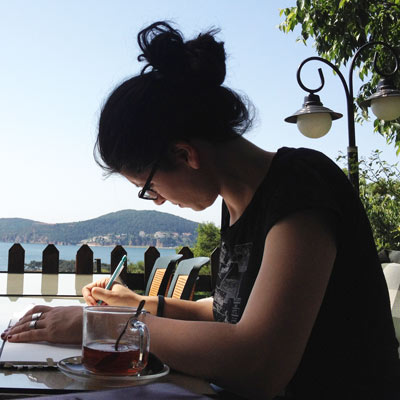4 Lessons Learned From 4 Years of Being a Creative Nomad
Becoming a nomad isn’t always a conscious choice. For Nathalie Sejean, it was the culmination of moments out of her control — but those moments changed her life, and today she shares what she’s learned since then.
Los Angeles Airport. December 24th 2011. 8pm: I was waiting at a Turkish Airlines counter, armed with a Persian cat, a camera and three overweight suitcases. After a few years growing as a filmmaker, and a whole 365 days trying and renew my visa, I had to depart from the United States with what I could physically carry, leaving everything else behind.
I spent Christmas Eve flying over Earth and wondering what my next step was going to be. I had no plan. I had no money. And, though I didn’t know it back then, I had no creative juice left in me. I was in full creative burnout.

The idea of chasing money to make rent had become the reason I would take on projects, and the justification behind the shrinking time I would spend creating for the sake of it. And I couldn’t take it anymore.
Wandering Istanbul, I decided not to pay rent again until I had found my creative balance back. Life unfolds in unexpected ways, as it always does, and that day I embarked on a journey I didn’t even know was an option.
I thought I would live as a nomad for a few months. It’s been four years.

During my annual review, I realized there were 4 key lessons living out of a suitcase has taught me:
1) Creativity never strikes where you expect it.
I used to think that to be creative, you needed to have the perfect setting and mind-space; so when I became a nomad, I thought my destination would be where the muse would show up.
Turns out when I’m in beautiful places, or with loved-ones, I don’t create. I absorb plenty of raw data, but I can’t transform and produce. It’s when I sit, stay still, and remain silent that the accumulated data takes a life of its own and ideas appear.

2) If you can only talk with your hands, you’ll cut to the chase.
When you don’t speak a language, or speak it poorly, it is exhausting to try to express yourself. Each word must be carefully chosen to convey what you want to say as clearly and quickly as possible.
It feels like you’re three years old again. You can’t say much and everything will lack subtlety. I love this bizarre state where you regress and can no longer hide behind big statements, quotes and concepts.
When you master a language, there is easiness in aligning one world after another, responding to whatever is said without giving much thought about it.
But when you have 25 words, two hands and a limited amount of energy to converse, you start paying attention to every idea you want to share: “Do I really feel so strong about this idea that I want to try to explain it?” I now know what ideas I can’t not fight for, and when I can let go, lay back, sip my beer and listen to the noise.

3) The “analog web” is your most valuable asset.
Regaining my creativity meant making it a priority (and thus making very little money). To add insult to injury, I’m terrible at maximizing miles, points, benefits and getting stuff for free. So how do you not pay rent for four years and not end up living under a bridge?
You cultivate your analog web.
Your analog web is made of your loved ones, the people you care about and who care about you. It’s gotten hard to connect to our loved ones, despite all the tools at our disposal. We get jobs in other towns, we get busy crossing off all the must-dos on our to-do-lists, and years can pass before you can see people you really care about.
One of the biggest perks of my life now is that I’ve been able to cultivate my relationships by going to see the people I love. I adapt to their lifestyles and rhythm, building new memories with them as we work (them for a salary, me not), and I am an active participant in their lives for several days at times.

4) Everything will work out as long as you’re kind to yourself.
Being kind to yourself is much harder than being kind to others (or being mean to yourself). But when you change places every few days or weeks, sleep on couches, and spend a lot of time on public transportation, being kind to yourself is a must if you want your body and mind not only to stay healthy, but to thrive.
I’m constantly reminded that there is no solid ground but the one within, and that plans can get disrupted in a blink: a friend can no longer host me; my computer, camera and phone die within a week; a loved one dies; I hit my pinky toe; I lock myself outside the apartment; I can’t create. Disruption comes daily to agitate me, but it’s the way I react that determines how I get through it, and what I get out of it. And I found that being kind to myself was the best way to always make it work.
Everything is not perfect being a creative nomad. But I feel richer with these four lessons, and whatever happens next, that I’m better armed to lead the life I want.
Follow Nathalie’s art and life at her site or on Twitter @mentorless.
###







